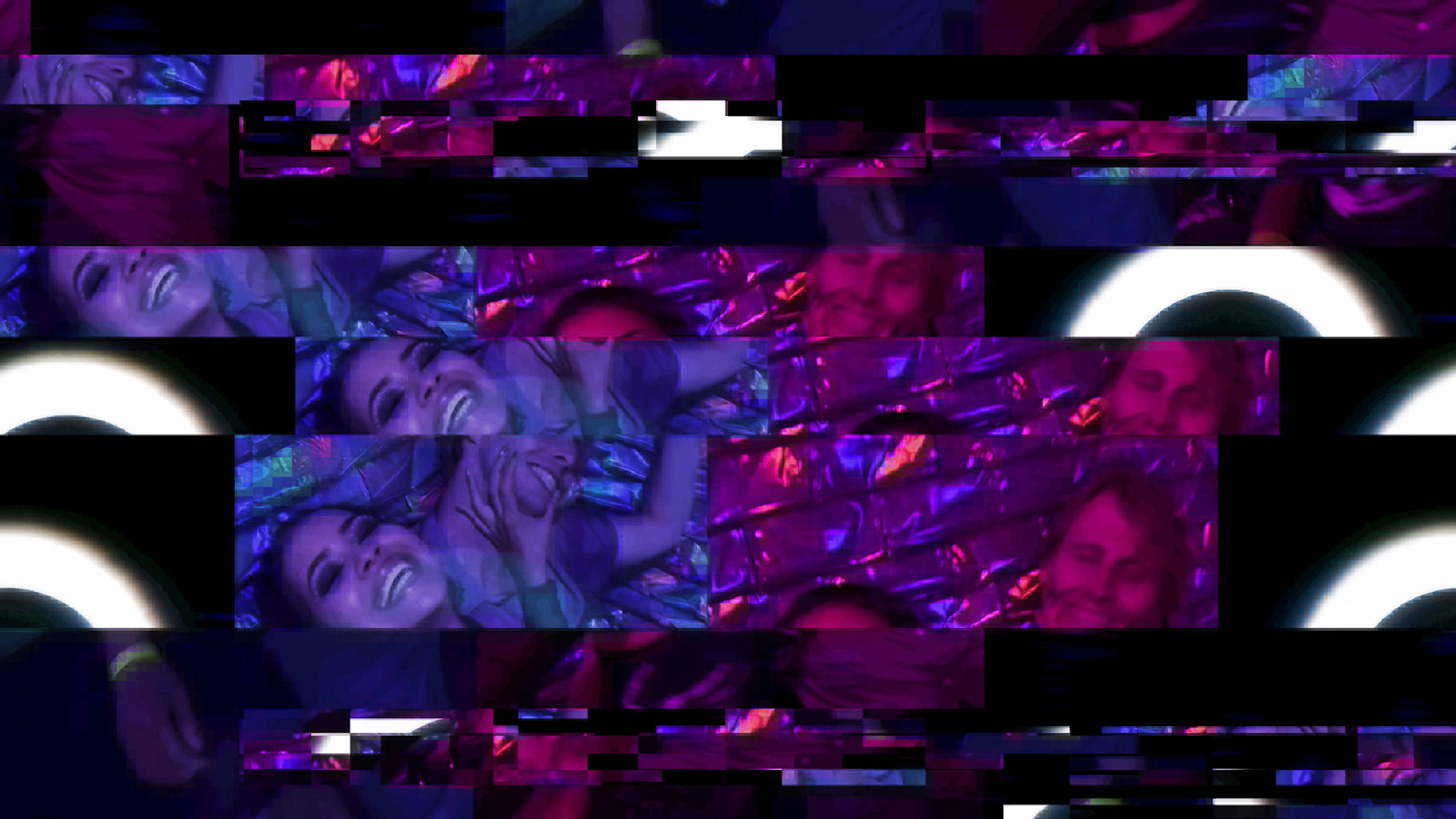Matthew Carter – electronic, experimental, metal, pop, rock
Vivian Hua – dance, indie, pop, psychedelic, soul
Troy Micheau – classical, electronic, experimental, instrumental
Judy Nelson – dance, electronic, indie, pop, psychedelic, soul
Elizabeth Perry – indie, mainstream, pop, rock
Peter Woodburn – classical, instrumental, metal
XUA – electronic hip-hop, mainstream, pop
Matt Carter’s Picks
Slow Graffiti – Los Angeles EP
High energy trap and hip-hop, with plenty of chop and screw from the mean streets of LA.
Umberto – Confrontations (Not Not Fun)
The soundtrack to a ’80s sci-fi/horror film that will never exist, look for it on a VHS near you.
With the recent influx of rock two pieces, we can be quick to write some bands off simply because they downsized to save car space. But for Gloomsday less members doesn’t mean less rock, and the band treads with an always numbered, never outgunned approach. Paradise Tossed is full of big beats that won’t discourage you from the occasional hip shimmy. Justin Cota’s burly low end may have the quality of announcing “rumble at the old watering hole,” but his restless tales of edgy love and natural disaster are very deserving of it.
Pacific Air may have the moniker of a Beach Boys tribute band, but that is because Stop Talking is drenched in the irresistible mirth you only get from growing up in So-Cal. Catchy synths and danceable sing-alongs may currently be commonplace ’80s revival, but their contemporary use of pop lines and indie overtones comes as quite refreshing. The subject matter deals in the lighthearted throws of relationships and the deceptive nature of summertime living, making it a bubbly upbeat release you can enjoy at all times of the winter without guilt.
Moderat’s sophomore release, II, is another entry in the pairing of Berlin’s own Apparat and Modeselektor, with more accessible results than their 2009 debut. Moderat is three producers consolidating their creative output into highly stylized electronic music, with breathtaking moments that gracefully utilize their foundation in the Berlin IDM scene. The tracks draw from a fusion of glitch, minimal techno, and some hip-hop leanings, for an album that better establishes Moderat as its own confident entity, and less as a fair-weather side project.
>>> See: Moderat – “Bad Kingdom” Music Video Making Of Interview
Mike Patton’s dedication to Tomahawk has been unaccounted for since 2007. Last year, when the band played their first shows together since the album cycle for 2003’s Mit Gas, fans still hadn’t the faintest on where the quartet would go in their artistic aspirations. Oddfellows is neither another concept album of aboriginal compositions, nor does it feature the high-octane scatty singing of Fantomas. Oddfellows is a return to the twangy experimental rock that comes about when you put four ringers together after Duane Denison’s guitar has stewed in noisy post-rock riffs for several years. If it can get weirder, it will.
It took nearly seven years for siblings Karin Drejier-Anderson and Olof Drejier to make Shaking The Habitual, but the influence of political manifesto heard throughout the album will be felt for years to come. The pair’s use of offset sounds and unconventional dance timings doesn’t intend to conform to anything politically, or even within current popularity of electronic music. Deadpan interludes of discordant anxiousness or plodding silence can range from 37 seconds to almost 20 minutes, but the albums dark reinvention of the band’s sound and willingness to take risk make it easily the top electronic release of 2013.
>>> SEE: Full Album Review
Vivian Hua’s Picks
(In no particular order)
Forest Swords – Engravings (Tri Angle Records)
Biosexual – The Window Wants The Bedroom (Debacle Records)
Empress Of – Systems EP (Terrible Records)
Nils Frahm – Spaces (Erased Tapes)
Daft Punk – Random Access Memories
Natasha Kmeto – Crisis
Nevermind that I can’t quite get down with the album title of My Friend Fish (though I’m sure it has its own personal significance); the record was an instant favorite and continues to be so. On it, Foxygen’s Shaun Fleming manages to bundle together my favorite genres into one mind-blowingly awesome and diverse record, leading one to give him massive props for his wide array of talents and ability to turn completely random recording whims into an absolute hallmark.
>>> SEE: Full Album Review
A reflection of the joys of emerging from dreary winters into springtime bloom, Royal Canoe’s Today We’re Believers is an unpredictable record showcasing indie pop at its multidimensional finest. Rich with multi-octave harmonies, layered vocal melodies, and ridiculously satisfying synth lines, the record easily cements the band as up-and-comers to pay close attention to. And their live show is just as, if not even more, satisfying.
>>> Royal Canoe Band Interview: Today We’re Believers + Live Show Review
Though she has been out of the musical limelight for quite some time, Nicole Wray is someone whose name has stuck in my mind through the years, ever since her late-’90s R&B collaborations with Missy Elliott, on such tracks as “Make It Hot”. I was totally ecstatic to see her return this year – and even more excited to realize that her latest project, Lady, has retro soul stylings that do justice to both the old and the new. Their self-titled debut is satisfying all around, filling a particularly warm niche that contemporary indie-electronic R&B just misses sometimes.
With Kissland, The Weeknd has changed his tune and matured at least a bit – still singing a bit about drugs and sex, but perhaps moreso about love and human observations. This change isn’t without hiccups; some vocal melodies are repeated for far too many bars, and I absolutely hate the track guest-starring Drake – but there is something about this record that lodges itself constantly into my head. This record does possess the same sonic palette throughout — but it is successful, with finely balanced experimentalism and deeply stirring moods that hardly get tiring, even with twelve tracks.
Psychedelic rock captured a lot of my attention a couple years ago — but lately, my overwhelming reaction “meh!”. With some very notable exceptions, the genre tag seems to be overused, with too much of it punctuated by stereotypical throwbacks and homages. Festivals dedicated to psychedelic music often seem populated by rock bands that never left the ’60s and ’70s and are perfectly happy to stay there forever. It’s fun to lose yourself to, but in the long term, it’s rather boring. This year, though, French art rockers Moodoïd have captured my attention both with their inventively entrancing psych pop songs and their excellent taste in video art, which transport one on some sort of magic carpet ride into glittering multicultural lands. They also get extra props for not singing in English.
>>> SEE: Moodoid – “Je Suis La Montagne” Music Video Making Of Interview + Full Album Review
Troy Micheau’s Top Albums of 2013
(In no particular order)
Daniel Lopatin’s newest full-length was probably the most confounding record that I came across this year. At once beautiful and restless, R Plus Seven made me a thousand times more uncomfortable than his last record, Replica, though that one was more overtly intense. Here, Lopatin subjects us to seemingly random blasts of soothing, ’90s romper presets that seem to say, “Hey, chill out, have a seat here, wait no here, wait no…”, on and on for an hour. At first I felt like it was a complete mess — like he choose his midi notation and corresponding sounds with the roll of a dice, but something kept bringing me back. This record seemed like a challenge, and it actually felt like there might be something to gain from giving it more time. So I did, and there was, I think. I don’t really know how to explain it, I’ve never really been able to describe exactly what it is about Lopatin’s music that really draws me in, but whatever it is, it’s here, and it’s somehow more defined than ever, despite the clutter. Or maybe because of it. I’m not sure (this record isn’t about certainty, maybe?) but what I think I know is that R Plus Seven sounds to me like the beautiful WAVs between our more quantifiable states, seeping through the Escherish floorboards that we take for consensus reality. And I’m down with that, I guess.
>>> SEE: Full Album Review
Tim Hecker has had a formula for the last few years: give the people something beautiful and then slowly shred it to pieces until the synth or sample or whatever has been reduced to a meticulously modulated cloud of overdriven dust. It was a great trick that worked beautifully on albums like Harmony and Ultraviolet and Ravedeath, 1972, but I’m glad that he decided to broaden his palette for Virgins. Here, Hecker and a few session guests treat us to a variety of chopped up bits of dirgey tones and timbers from all over the frequency spectrum, including the airy strings and dilapidated pianos of the previously mentioned albums as well as some light percussion and a bassy modular doodle or two. (That’s right, something resembling drums on a Tim Hecker record!) Don’t expect any grooves here though; these pops and clicks get the same dream-like filter treatment as the rest of the instrumentation on the record, serving as gated textures rather than anchors. And yes, there is a bit of distortion, but it doesn’t serve as the inevitable end for every sound on this record. The feedback and white noise simply punctuate the tonal characteristics of the source material rather than destroy them completely. This more subtle display of nuance, taken with the expanded array of noisemakers, sets Virgins apart in Hecker’s catalog, and I feel that it marks the beginning of a step up from his previous role as talented ambient producer to one of the most interesting experimental composers of our time.
Time is the true test for any record. What sounds awesome the day you rip open the plastic or click on the link might sound like poop a month down the road. I reviewed Engravings over the summer, and I can say without a doubt that I stand behind all the praise that I heaped on it, and then some. I found this to be the most endlessly listenable record of 2013. The melodies and percussive loops are just so visually evocative that I felt like was getting a full A/V experience whenever I jammed it in headphones — and while I’d say the compositions are fairly minimalist on the whole, there is enough subtle variation and ear candy to lead to new discoveries with every listen. Thematically, Engravings is wide open to interpretation, which is actually one of its strongest points. When I initially reviewed the record, I mentioned nature reclaiming abandoned industrial sites and how that was representative of larger cycles within the state being — but honestly, you can drop all of that pretentious horse shit if you want and carve anything out of this music so long as it’s important to you. There are no frilly tracks or pop jingles on Engravings. It definitely speaks to something powerful. But the fact that it has been so malleable, at least for me, is a high part of what has really kept me coming back over and over.
>>> SEE: Full Album Review
I know that I just went on and on about how the new Forest Swords was super listenable etc, etc. But man, The Inheritors had to be my favorite record this year. I mean, it’s just so fucking awesome. James Holden really cast a wide net with this release, blending some of my favorite shit from techno to free jazz and krautrock to modular synthesis and seemingly every other niche of electronic and experimental music, into a shockingly coherent narrative that is surprisingly easy to listen to! Even catchy at times! And without dumbing anything down or glossing over the gnarlier aspects of the aforementioned genres! I’m a huge fan of records that a) take you on a journey and b) do so by forging the least obvious route possible while c) imparting a sense of confidence that whatever weird ass road you’re on is going to lead somewhere meaningful. The Inheritors delivers on each of these fronts. And hell, even if it didn’t, “The Caterpillar’s Intervention” and “Sky Burial” would be enough to win me over anyway. Solid jams, those. Go buy this right now.
Music Has the Right to Children was one of the first electronic albums that I owned, and it still has a special place in my heart. The rest of BoC’s records are fine here and there, but they never grabbed me quite like that one and to be honest, I don’t know that it would hit me as hard if I heard it for the first time today. The chill out beats and nostalgic samples just haven’t aged well to my ears. But those things are pretty much absent from Tomorrow’s Harvest, giving the otherworldly synths and textures full reign to grow and expand beyond the bounds of general human emotion and into the stratosphere of unknown cosmic experience. This may be the darkest and most mysterious BoC release yet. There are no samples of children playing, no light-hearted tracks for casual listening on a sunny afternoon. Instead we have the basic BoC sound infused with the eerie and psychedelic vibes of electronic music’s 1970’s heyday — a tradeoff which gives the duo a sense of grandeur that they’d only hinted at before and suggests that brothers Michael Sandison and Marcus Eoin did some soul-searching in the eight years since their last album and came back a little older and wiser.
Judy Nelson’s Picks
(In no particular order)
Kanye West – Yeezus (Roc-A-Fella Records / Def Jam Recordings)
His public persona keeps getting worse, but his music stays top quality. He’s still one of the best producers out there, and while this album took awhile to wrap my brain around, seeing it live confirmed that these songs are great. He’s not god, and I don’t think anyone is going to hurry up with his damn croissants, but for now, we’ll appreciate that he’s talented.
>>> SEE: Full Album Review
Toro Y Moi – Anything In Return (Carpark Records)
Anything In Return‘s an album I reviewed for this site earlier this year that has stuck with me. I have always found Toro to be a fun, easy listen, and while this record is more dancey-electro than I expected, it’s still a very good time. He always comes off as light-hearted, and we all need a little of that in our lives.
>>> SEE: Full Album Review
Mr. Gibson’s take on the blues-rock genre is one of the more unique musical styles to hit the airwaves in 2013. His dark, thought-provoking voice, combined with unusual song structures, makes this record a winner for me. It will never be as good as his debut from two years ago, but it’s still better than most records put out this year. Every song works so well together that it’s hard to pick a stand out track.
This is an album that slowly unravels, producing more compelling songs upon deeper listens. Pulsing, intricate, and upbeat, Young Galaxy’s lead singer Catherine McCandless’ voice is so compelling that it’s impossible to not be drawn in. Managing to be both whimsical and down to earth, Young Galaxy’s Ultramarine creates a beautiful soundscape. Favorite songs include “Hard to Tell” and “In Fire.”
Another unique record from a seasoned, well-loved producer. Matthew Barnes has been making music in the electronica scene for a long time, and this is his second proper release under the Forest Swords moniker. Upbeat and moody at the same time, this record was a high point of the year for me. “The Weight of Gold” is the midpoint and it really anchors the album, but all the tracks are quite excellent.
>>> SEE: Full Album Review
A collaboration between the Atlanta MC Killer Mike and the Brooklyn-based producer El-P, this hip-hop album was a clear winner this year. Hip-hop that makes me think is always a positive, but these do balance each other out so well, it’s a match made in heaven. Their on-stage chemistry is nothing to scoff at, either.
Very few people are making straight rock n’ roll as interestingly complex as Mr. Vile is. I was an instant fan of his last record, Smoke Ring for My Halo, and since then, I’ve delved deeper into his back catalogue. His 2013 release is a beautiful mixture of alt-country and straight-up guitar rock. He’s skilled at making these styles feel fresh and current, which is an impressive feat in this modern age.
Elizabeth Perry’s Picks
Moodoïd – Moodoïd EP
Tei Shi – Saudade EP
Usually when you put Sigur Rós on, it’s the perfect time to put Sigur Rós on. On their most recent LP, the band really embraces their trio-type sound, with more prominent percussion and a combination of instrumentation and vocals that creates a grounded sense of expansiveness. Appropriately grand, intense, and delicate, and in-line with Sigur Rós’ otherworldly, moving, and stripped down yet complicated aesthetic, Kveikur is another album from the past year I would not go without.
A controversial prospect for die-hard Radiohead or Thom Yorke fans, Amok engendered mixed reviews upon its release, ranging from “lazy” to “fun” to legitimate in its own right. Amok is not a Radiohead album, and while it would’ve been great to hear even more of what such a super group as Atoms for Peace has to offer, the album provides an awesome listening experience. Very much a product of and response to the modern world, Amok is stark, unsettling, appropriately clunky and — underneath all that — strangely soft and feminine, to an extent that definitely makes the record deserving of due acknowledgment.
It might’ve been hard for James Blake to follow-up his transporting self-titled full-length debut with something to match the former’s amazing composition, variety, and soulfulness, but by digging even deeper inside himself, he was able to do it. Through a combination of gospel chord progressions, expert sampling, heavy dance beats, and—as ever—his own unbelievably rich vocals and poetic lyrics, Overgrown charts Blake’s next phase as a singer-songwriter-electronic musician with just the right balance of profundity and risk-taking.
One of the most highly anticipated albums of the year, Arcade Fire’s follow-up to The Suburbs did not disappoint. On Funeral and Neon Bible, we shared in Win Butler’s scrutiny of society at large; on The Suburbs we delved with him and the band into our collective past; and now, on Reflektor, we’re all being taken to yet another level—one that is even more personal and profound. Having worked their way up on their own terms, the Arcade Fire proceeds with the attitude of a group of musicians that literally can do whatever they want—and with good reason. The drums on Reflektor are sick, Régine is lovely, Win is in control, the band is cohesive, and no one’s musical talents are wasted on this album that rocks, grooves, cowers, and celebrates all at the same time.
An unbelievably personal and heart-breaking full-length LP, Trouble Will Find Me epitomizes The National’s ability to continually hone and refine their sound album after album. Throughout the record, we hear the band branch out into more experimental territory instrumentally, through electronic sounds and alternative embellishments previously unfamiliar to the band’s somber rock. Meanwhile, Matt Berninger’s vocals—the heart of The National—express through sprawling lyrics more unfiltered and uninhibited than we’ve ever heard before the truest nature of feeling bad, in all its complexity. With a clear and unhindered vision, these dimensions merge expertly into the record’s cohesive sound and spirit, making Trouble Will Find Me the closest thing to a concept album we’ve heard yet from The National.
Jason Simpson’s Picks
After a couple decades of being immersed in electronic music, you can get pretty tired of virtual sounds — those that have never left the hermetic isolation of an audio program. Our human ears desire sounds that come from someplace; we need something to hold on to, while being deluged in the digital diaspora. With a disorienting array of field recordings and manipulated audio, producer Leyland James Kirby creates a convincing, holographic headtrip. Watching Dead Empires In Decay is like taking a guided tour through Chernobyl, or a ruined city in a Tarkovsky film. It’s a fascinating, ghostly psychogeographic ramble, that manages to assimilate the best parts of leftfield techno, dark ambient and immersive soundscapes. Get lost…
It’s incredibly satisfying to see a band 20 years into their career creating some of their best music. The Invisible Way stays true to Low’s distinctive slowcore template, but sees them getting more elaborate with their songwriting and arrangements. It reminds us what was so awesome about Low in the first place: their slo-mo soul; the rich, warm guitar tones; the heavenly harmonies of husband-and-wife duo of Alan Sparhawk and Mimi Parker. The Invisible Way is one of Low’s best, and a strong return to form. Here’s to hoping it earns them a bunch of new, well-deserved fans. Here’s to another 20 years of Low!
Joseph Stannard has been running The Outer Church club night in Brighton for the last four years, so seeing a lavishly packaged double CD, with some of my favorite names in electronic music, feels like a victory and a vindication. In his own words, Joseph Stannard claims, as a whole, the 28 artists on The Outer Church, “advance the argument that something weird is stirring in modern music which resists categorisation, manifesting itself in unsettling cadences and temporal distortions across a wide variety of occult strategies”, and we’re not inclined to disagree.” The Outer Church compilation is the No New York of New Wyrd Electronics.
Sometimes it can seem like both electronic music and guitar-centric indie rock can paint themselves into a corner, with nowhere to turn except to hash out degraded facsimiles. Along comes someone like London’s Factory Floor, who manage to fuse both worlds, and totally change the rules for both. Factory Floor are an exquisite example of the cyborg fusion of live electronics, guitar and vocal, executed with perfect precision, that manages to infuse dance music with some much needed soul.
Teeth Of The Sea manage to encapsulate all of my favorite things in one place: John Carpenter-esque minimal synthesis, storming industrial beats, mind-flaying guitars; there’s even a little jazz trumpet, as if they weren’t ambitious enough. Teeth Of The Sea are taking the better parts of the past, and creating something entirely futuristic. Master is like the H. R. Giger’s Alien of retroactive science fiction rock ‘n roll.
Peter Woodburn’s Picks
[10] KEN Mode – Entrench (Season of Mist Records)
[9] Oneohtrix Point Never R Plus Seven (Warp Records)
[8] Fuck Buttons – Slow Focus (ATP Recordings)
[7] Chelsea Wolfe – Pain is Beauty (Sargent House
[6] Jagwar Ma – Howlin (Mom + Pop)
The instrumental trio are one of the heaviest and contemplative in the business, and once again, their latest album is one of their best.
Tim Hecker is setting himself in a league all his own in the noise/experimental area with his most excellent follow-up to Ravedeath, 1972.
An expansive concept album on dreams and nightmares is one of the best from the prolific Portland-based ambient artists.
The modern classical scene is making a big push into a more popular realm, and Spaces cements Frahm as one of the leading figures.
The metal universe abandoned big hair for thick rimmed glasses with one of the most beautiful albums of the year.
XUA’s Top Picks
Daft Punk featuring Michael Jackson (instead of Pharrell) – Random Access Memories
In the Neverland ranch of my imagination, 2013 was the year saw a somewhat healthy Michael Jackson complete work with Daft Punk and Nile Rodgers on RAM – reinvigorating his heavenly gifts and leading us to his 2014 comeback album BAD 2. RAM has its moments and “Get Lucky” may be the soundtrack to a post Great Recession America, but listening to it always reminds me of what could have been.
Lou Reed died this year. More important than having five best albums of the year is the passing of the coolest white person American has ever produced. He gave voice to voiceless. The Statue of Liberty should have the engraving: give me your tired, your poor, your huddled masses and Lou Reed will write an amazing song about them.
Like many, Lou was my personal gateway to the great other, a narrator of my exploration of dark and dangerous things. I was lucky enough to be given a copy of Transformer when I was 15, and within a year, I was reading Burroughs and playing through fuzz pedals. Check out Lou’s ‘70s work if you haven’t. It’s all over the map and always interesting. For a true dose of classic Lou Reed, hunt down the 1978 live record, Take No Prisoners. A double disc show that has everything you could want from a Lou Reed record: sloppily reinterpreted hits, insanely long guitar solos, berating the audience, thick New York accents and lots of the Lou. Rest in peace, amigo.
Seattle’s Midday Veil have grown into a wonderfully trippy live act worthy of a Factory acid party — but this year, they have accomplished a beautiful recording. The Current is wonderfully listenable and the best “psychedelic” record I’ve heard in years. The synth work and minimalist drones are a true pleasure to the nervous system; Emily Pothast’s siren vocals act as a welcome spirit guide through the murky Bardos explored on this excellent album. Add cannnabis for a extra kick to your medulla.
I love this record. It’s a complicated and experimental travelogue of the future, a truly modern and very listenable experimental album. The synth work is noisy and excellent; the compositions are spiraling and interesting. In my opinion, it’s an accomplishment to make a experimental record that is consistently this entertaining.
This year more than any, ironically in the year of our Lou’s death, experimental sounds are being played with on a larger scale than in recent memory (see number 2). Holden certainly takes his mission as a painter of sound seriously. In this album are whole neighborhoods of synthesized entertainment. Is there anybody making electronic music as curious and cool as the opening track “Rannoch Dawn”? From there, the ramp up to track 4, “The Caterpillar’s Intervention”, is so moody that once the scronky Albert Ayler like sax solos come in to take the track to new heights, you’ve already felt like you’ve been on the worlds most interesting vacation package.
One of the last public things Lou Reed did was write a straight up rave of Yeezus, the ridiculous new album from Kanye West. I had a hard time placing this second after the unfortunate video for the album’s terrible closer “Bound 2”. But the way I see it, if I would’ve done that, then he wins. I find the rest of the album delightful. Read my review here.
Thank you for this record, David Bowie. How’d you know it’s what we’ve always wanted?
Many people assume that like his sometimes collaborator, Lou Reed, Bowie made some bad albums in the ‘80s, ‘90s and ‘00s. But they’re missing out by not mining his output since his golden years. Tin Machine precluded the grunge era, Outside was a triumphantly dark concept exploration with Eno, Black Tie, White Noise will see its stock rise as the ‘90s R&B revival continues. But it is true that none of those records have aged quite like the Berlin years. We know this; Bowie knows this.
Like last year’s New Adventures in Nooky Wook by John Cale, The Next Day marks a culmination not of Bowie the legend but of Bowie of the 21st century. Both Cale and Bowie have been carving a new sound for themselves in the new millennium. Starting with Hours in 1999, Bowie began to embrace his age and attempt to reconcile the years with the facts. 2002’s Heathen and 2003’s Reality kept reaching for greatness in the same vein and succeeding in moments. Then he had a heart attack on stage during the Reality tour and, just like that, ten years went by.
The Next Day is a near perfect record and a total encapsulation of all his work. His crooning vocals, especially, are in great form. There is not an era of his own career that doesn’t get referenced on this album but the Berlin trilogy and their underrated sister, Scary Monsters, is mined heavily to chilling effect. It’s a record for fan boys — the kind of record Lou Reed would never make for us. It’s also often a sad meditation on death, near death, and the deaths yet to come.
Ω







